December update continued
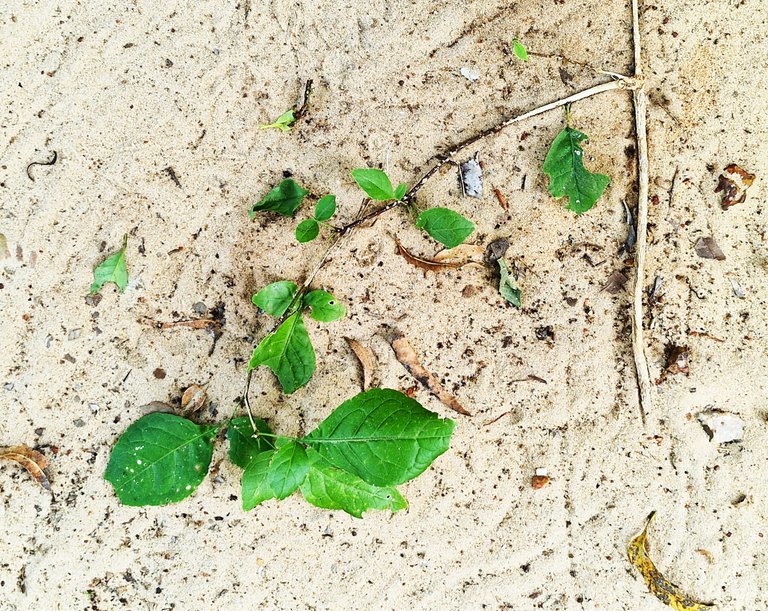 the biggest surprise in the garden this year is that our bael tree, Aegle marmelos has produced a side shoot. it's great news. the tree is considered sacred, the trifoliate leaves representing the three eyes of Shiva. we planted the tree some years ago without high expectations of it doing well. though the bael can survive in a wide range of soils including sand it does not tolerate any form of pollution and only grows in places that are spiritually clean. it's spreading at such a young age is a very good sign
the biggest surprise in the garden this year is that our bael tree, Aegle marmelos has produced a side shoot. it's great news. the tree is considered sacred, the trifoliate leaves representing the three eyes of Shiva. we planted the tree some years ago without high expectations of it doing well. though the bael can survive in a wide range of soils including sand it does not tolerate any form of pollution and only grows in places that are spiritually clean. it's spreading at such a young age is a very good sign
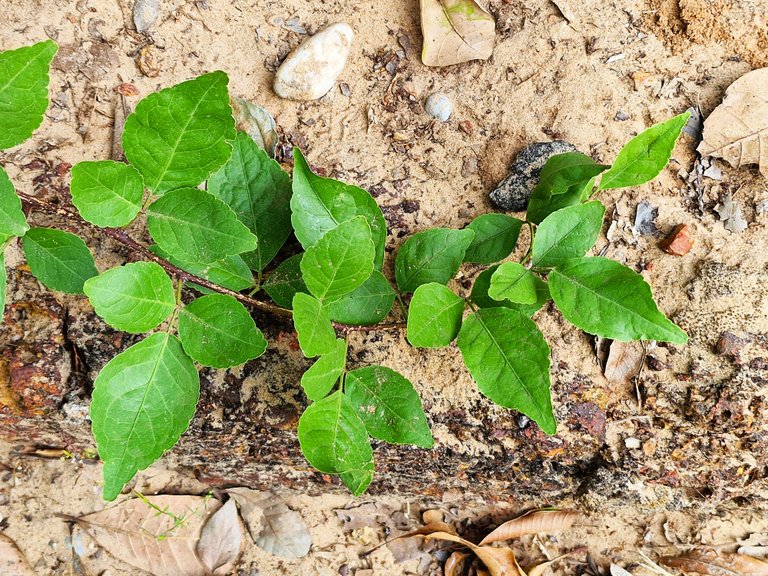 the mother tree is only about 2 metes tall and the branches droop but the side shoot is clearly from a root
the mother tree is only about 2 metes tall and the branches droop but the side shoot is clearly from a root
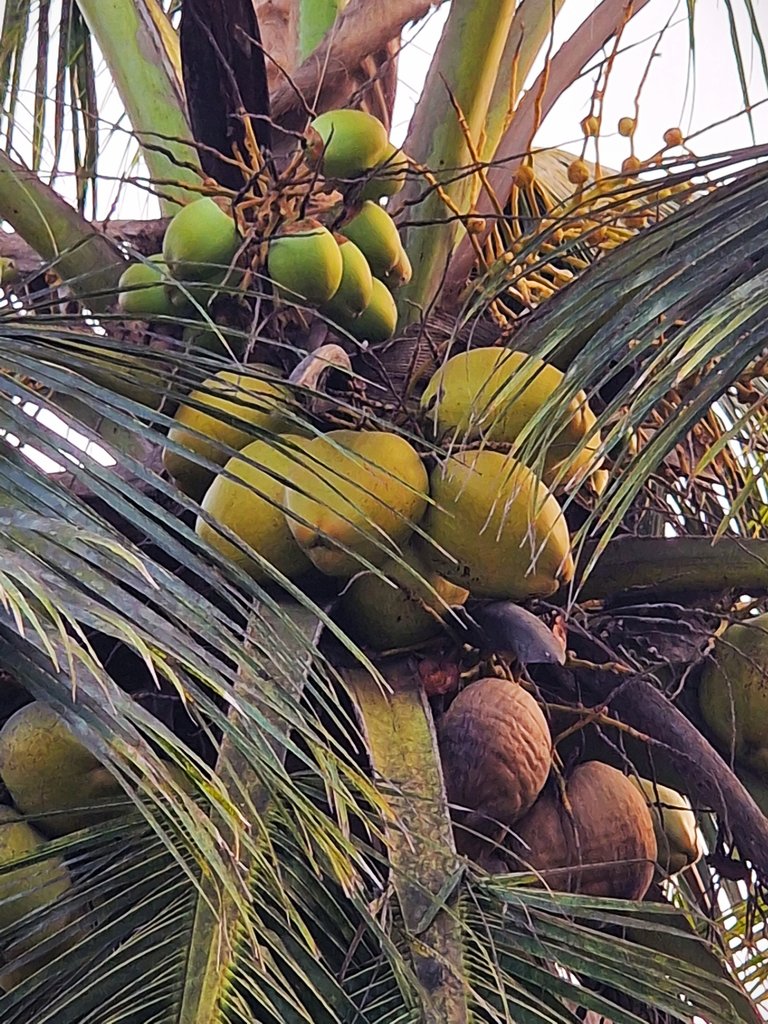 our main crop is coconuts though not all the trees bear fruit. most of the ones that do produce regularly all year round. here are 4 stages of coconuts in one tree. the lower brown ones are drying out and if not picked soon they will fall. they are still good- the flesh is more firm and contains more oil. so these would likely be dried and milled for oil coconut is one of the main ingredients in local curries, especially the popular staple food, fish curry rice. fully matured coconuts are avoided because they make the curry too grainy.
our main crop is coconuts though not all the trees bear fruit. most of the ones that do produce regularly all year round. here are 4 stages of coconuts in one tree. the lower brown ones are drying out and if not picked soon they will fall. they are still good- the flesh is more firm and contains more oil. so these would likely be dried and milled for oil coconut is one of the main ingredients in local curries, especially the popular staple food, fish curry rice. fully matured coconuts are avoided because they make the curry too grainy.
so the best curry requires ones like the yellow-green ones in the middle of the photo. they are fully formed in their prime with lots of water and softer flesh. the small young green ones will be ready in about 3 months while the tiny yellow ones to the right are just beginning to form
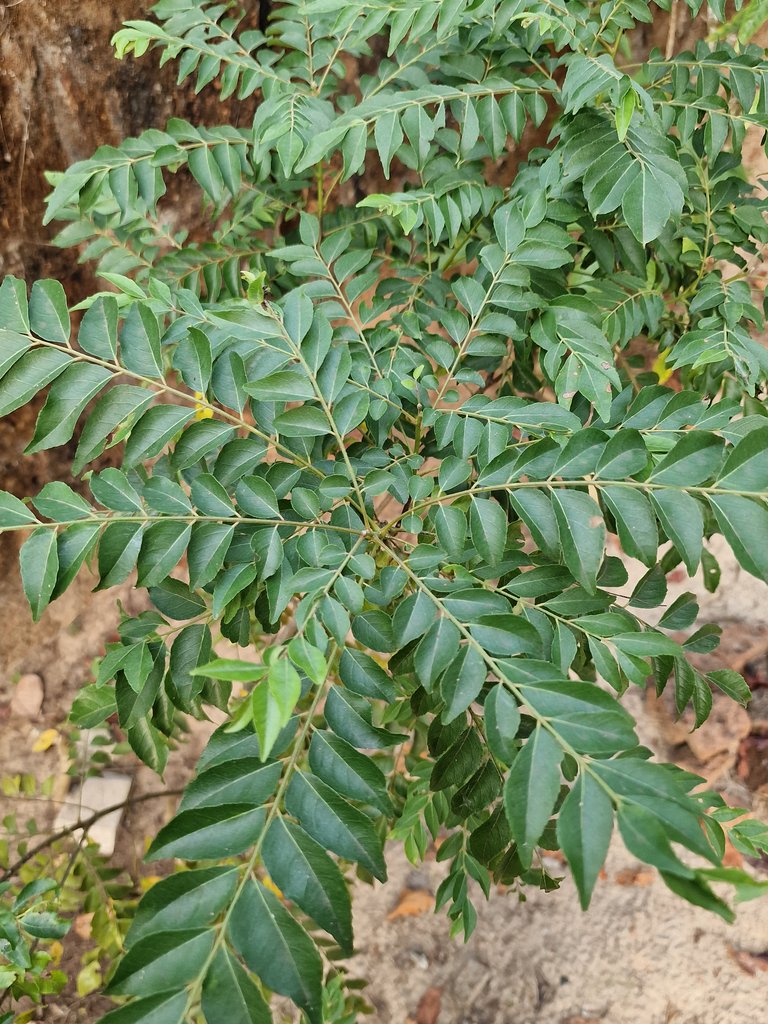 speaking of curries, this is a curry leaf tree, Murraya koenigii. it spreads all around the garden both by shoots and seeds and requires little care, just some occasional water. it has nothing to do with the curries i mentioned earlier and is not used in what westerners call curry or curry powder. however it does have a wonderful unique taste and is a common ingredient in many south Indian dishes. frequent culinary usage provides several health benefits, not the least among them reducing cholesterol and controlling diabetes.
speaking of curries, this is a curry leaf tree, Murraya koenigii. it spreads all around the garden both by shoots and seeds and requires little care, just some occasional water. it has nothing to do with the curries i mentioned earlier and is not used in what westerners call curry or curry powder. however it does have a wonderful unique taste and is a common ingredient in many south Indian dishes. frequent culinary usage provides several health benefits, not the least among them reducing cholesterol and controlling diabetes.
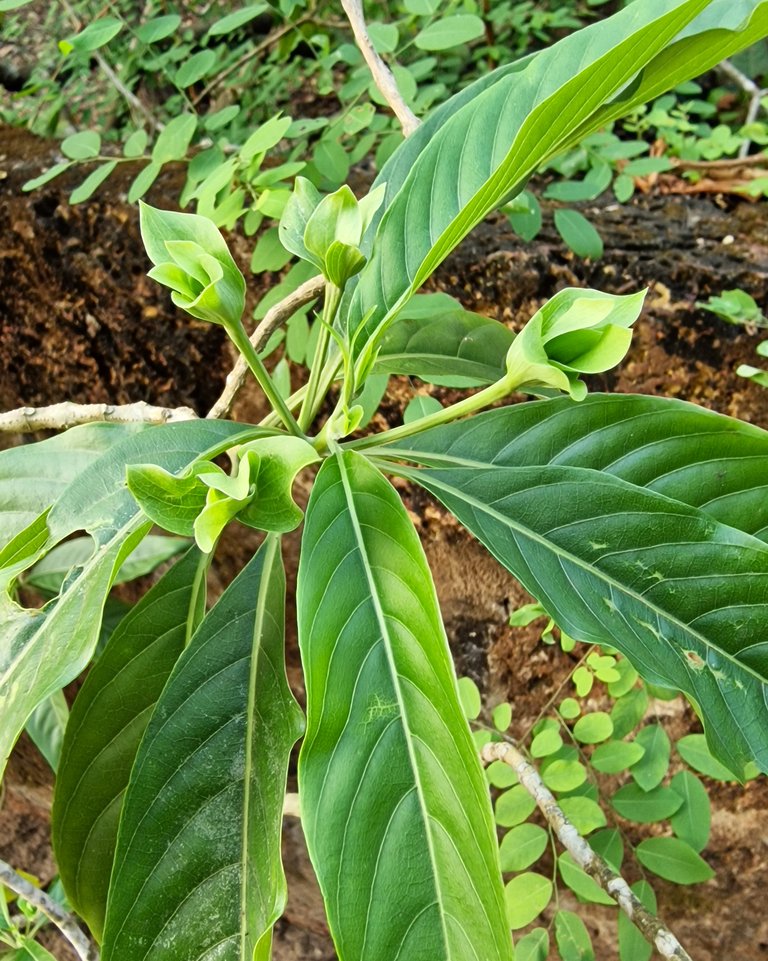 Adulsa, Justicia adhatoda is another medicinal plant that does well enough in the garden. it's too bitter to be used as food but it is the best natural cough medicine available. it's not a showy plant and if you don't know what it is you likely wouldn't pay much attention to it.
Adulsa, Justicia adhatoda is another medicinal plant that does well enough in the garden. it's too bitter to be used as food but it is the best natural cough medicine available. it's not a showy plant and if you don't know what it is you likely wouldn't pay much attention to it.
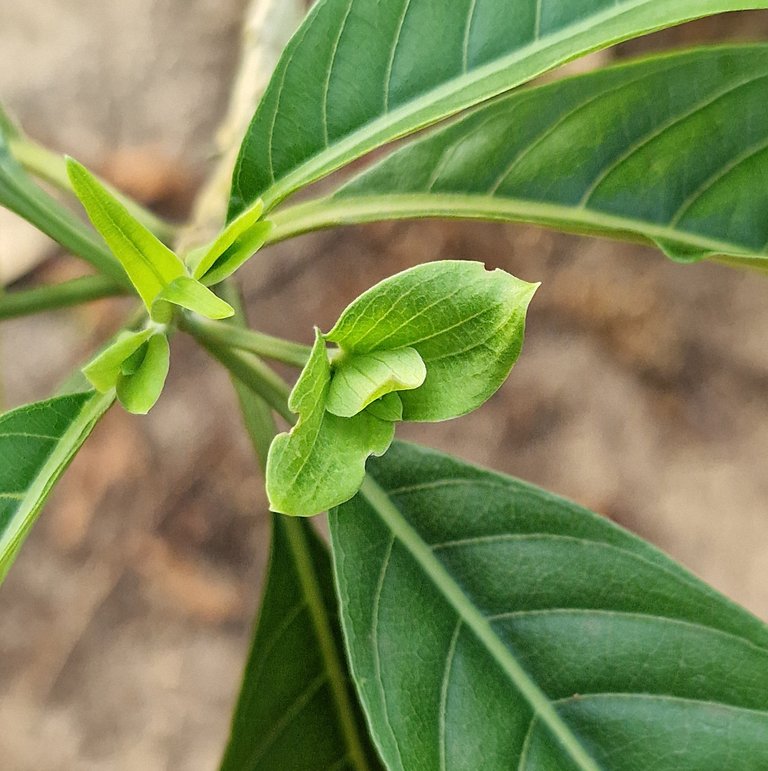 the flowers are so discreet that you may not even notice them but looks aren't everything. this is a highly valued plant and a great addition to the garden
the flowers are so discreet that you may not even notice them but looks aren't everything. this is a highly valued plant and a great addition to the garden
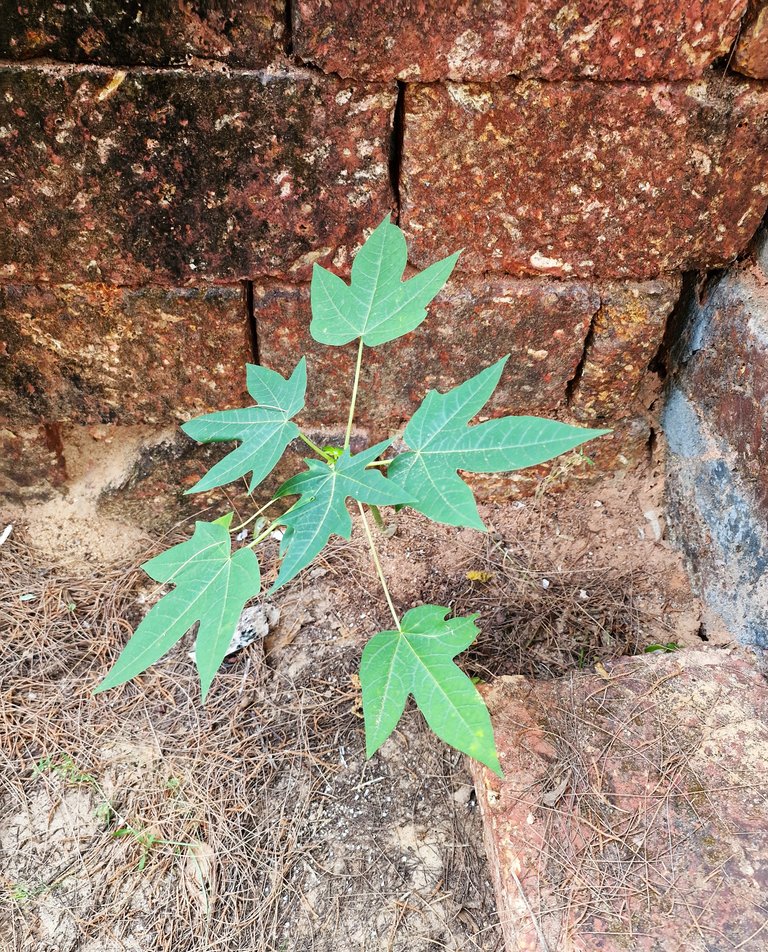 papaya, Carica papaya would grow easily in the garden if it was left alone. a crow or some other animal must have left a seed here by the door to our shed. the only problem with growing papayas is that the monkeys love the young leaves and eat every one we plant. they are very clever to get around the protection we build. the first couple of years we were eating wonderful papayas but first there was a blight on the fruits and by then the monkeys had figured out how to get at them so we gave up trying to grow them. i haven't seen any monkeys since we arrived but it won't be long before they find this plant. then again since this is already somewhat protected by the hut wall if we hurry we may figure out some way of fully protecting it long enough to get some of that awesome fruit
papaya, Carica papaya would grow easily in the garden if it was left alone. a crow or some other animal must have left a seed here by the door to our shed. the only problem with growing papayas is that the monkeys love the young leaves and eat every one we plant. they are very clever to get around the protection we build. the first couple of years we were eating wonderful papayas but first there was a blight on the fruits and by then the monkeys had figured out how to get at them so we gave up trying to grow them. i haven't seen any monkeys since we arrived but it won't be long before they find this plant. then again since this is already somewhat protected by the hut wall if we hurry we may figure out some way of fully protecting it long enough to get some of that awesome fruit
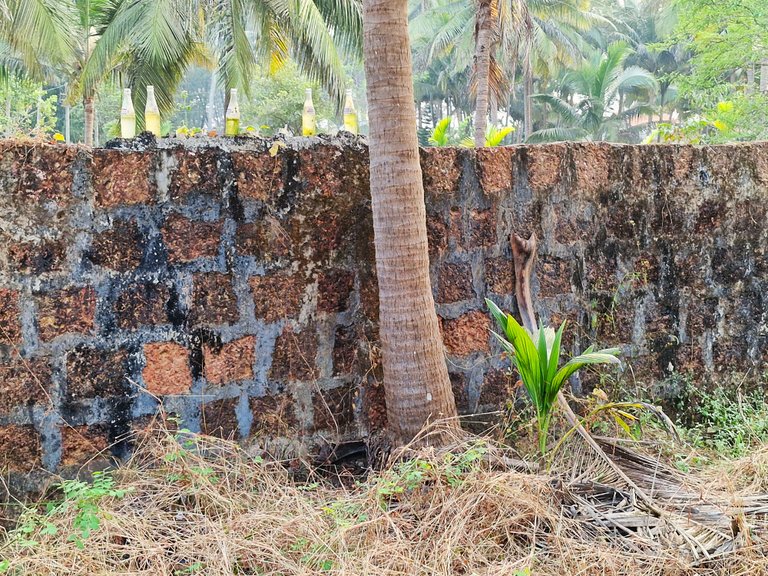 we built this compound/ stone wall around the perimeter of our property using thousands of laterite stones. it was a major undertaking but it had to be done if we were to have a garden with plants other than coconuts and fruit trees. the first years it kept out all the loose dogs that wander around everywhere and bark all night. eventually they learned how to climb over the lowest sections of it.
we built this compound/ stone wall around the perimeter of our property using thousands of laterite stones. it was a major undertaking but it had to be done if we were to have a garden with plants other than coconuts and fruit trees. the first years it kept out all the loose dogs that wander around everywhere and bark all night. eventually they learned how to climb over the lowest sections of it.
this was during the transition from glass bottles for beverages to plastic bottles. there was a significant deposit on the glass bottles but as soon as they became unused there was no longer any system for returning them so we collected several cases of bottles that later were cemented in place where the dogs managed to climb over. so far this has worked fine and our sleep is undisturbed.
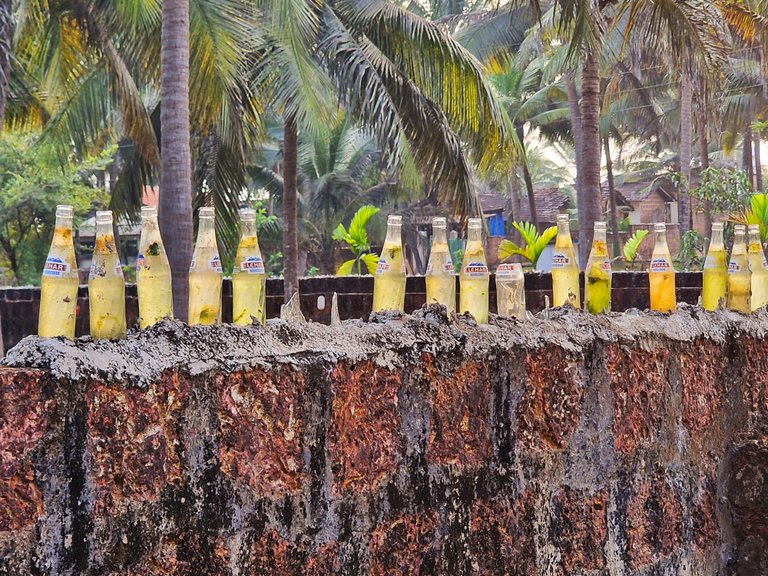 there has been a lot of unseasonal rain so the filled bottles stand on top of the wall as though they are on display
there has been a lot of unseasonal rain so the filled bottles stand on top of the wall as though they are on display
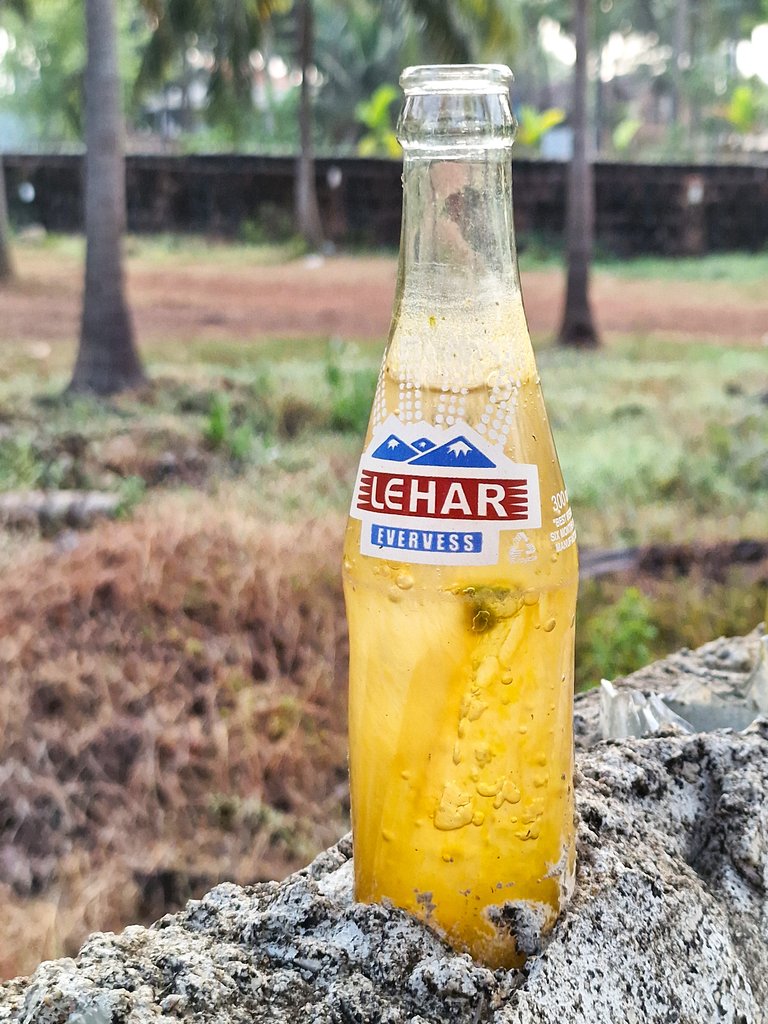 Lehar is the Indian subsidiary of Pepsico. it was once very popular but more recently other brands have taken over the market. we are the only locals who can offer not just one but two flavors, of the once ubiquitous beverage. yellow...
Lehar is the Indian subsidiary of Pepsico. it was once very popular but more recently other brands have taken over the market. we are the only locals who can offer not just one but two flavors, of the once ubiquitous beverage. yellow...
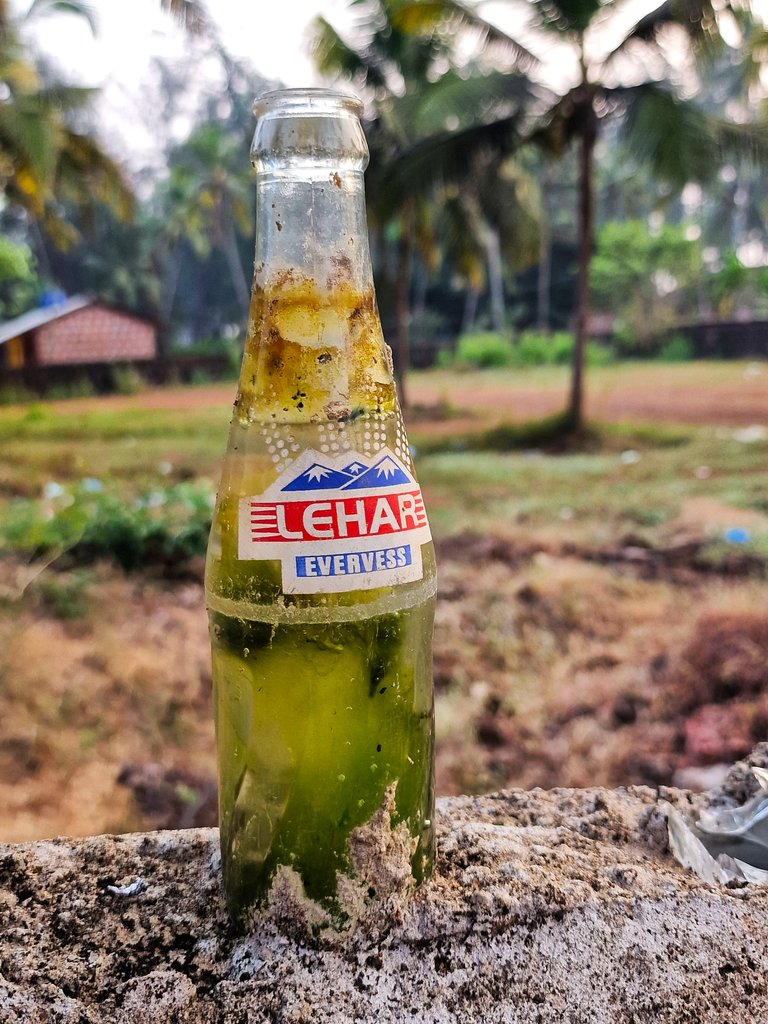 and green. personally i never liked the stuff and these brews are likely just as good as the original
and green. personally i never liked the stuff and these brews are likely just as good as the original
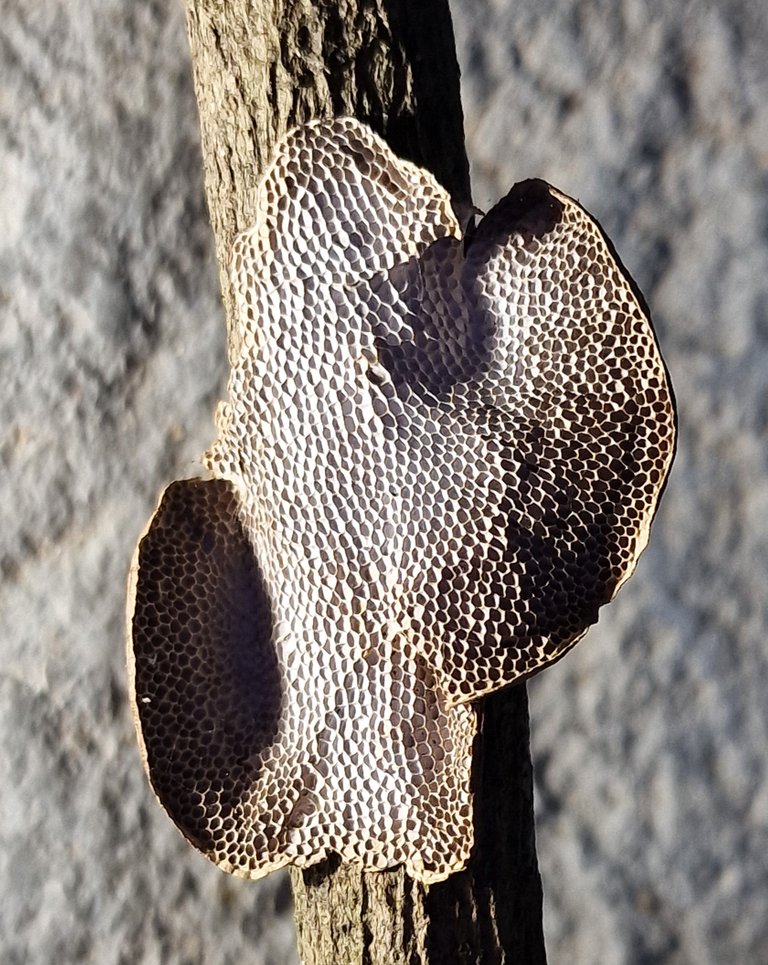 in addition to the mistletoe i mentioned in my first update some parasitic fungi are killing some of our fruit trees, especially the cashew and to a lesser extent the sapodillas. there are likely more than one species of fungus involved. this one looks very handsome indeed but our garden would be much better off without it. we would never consder any form of poison so we cut back whatever dieback we find but this year one tree is beyond recovery.
in addition to the mistletoe i mentioned in my first update some parasitic fungi are killing some of our fruit trees, especially the cashew and to a lesser extent the sapodillas. there are likely more than one species of fungus involved. this one looks very handsome indeed but our garden would be much better off without it. we would never consder any form of poison so we cut back whatever dieback we find but this year one tree is beyond recovery.
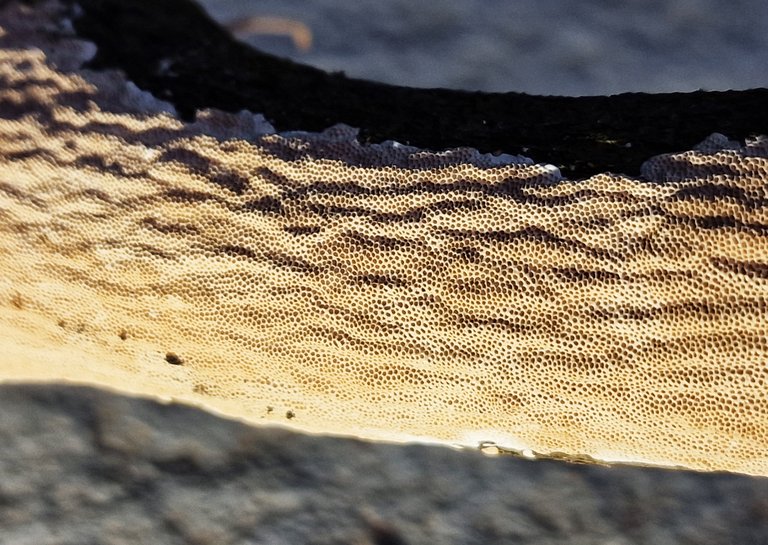 fortunately the trees grow very fast so i hope a couple of younger trees may be flowering for the first time this year. the season is just starting so let's see hoe they do
fortunately the trees grow very fast so i hope a couple of younger trees may be flowering for the first time this year. the season is just starting so let's see hoe they do
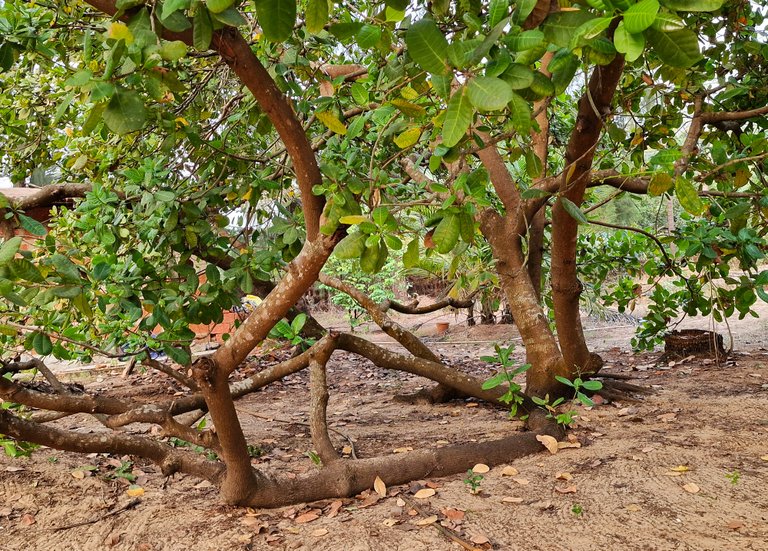 i have cut away all the dead wood i could find but there is certainly more fungal damage yet to be discovered. it's only after the branch is dead that the fruiting bodies ever appear. even if there are still leaves on the branch, the fruit and nut may be infested and worthless. we won't know until February
i have cut away all the dead wood i could find but there is certainly more fungal damage yet to be discovered. it's only after the branch is dead that the fruiting bodies ever appear. even if there are still leaves on the branch, the fruit and nut may be infested and worthless. we won't know until February
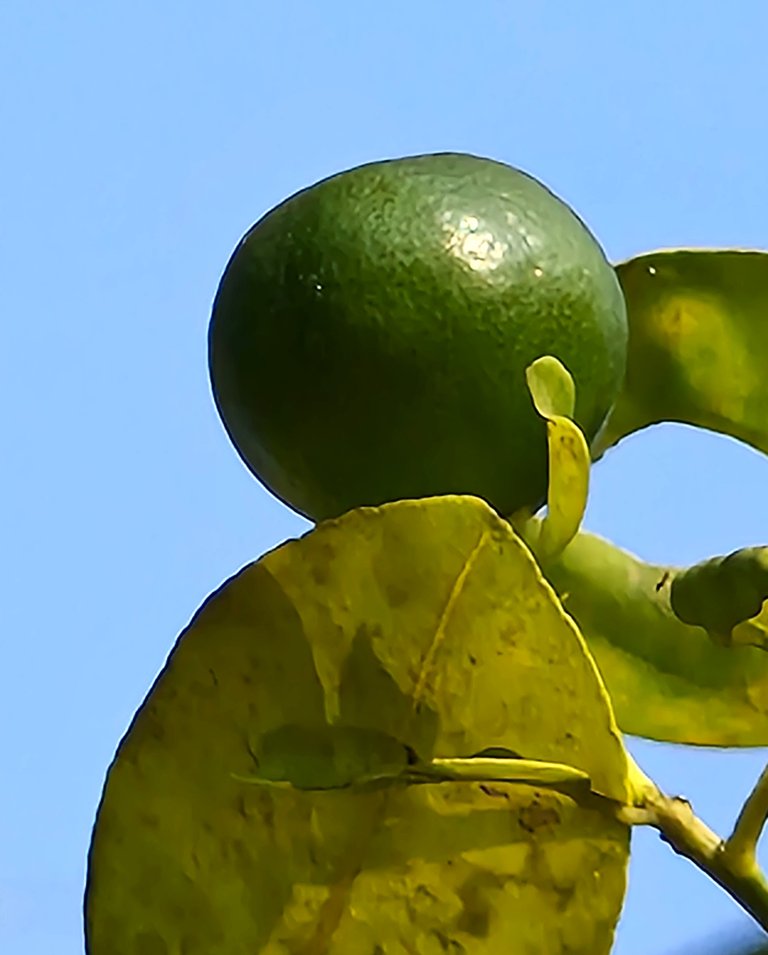 our lime trees are not flowering as profusley as in earlier years. i suspect termites are destroying the roots. we still get limes but not in the numbers we used to. one of the reasons we are not so eager to improve the soil is that termites struggle in pure sand. they survive in sand but cannot easily build their tunnels and structures in it. they do best close to the stone compound and in the places where we brought in rich soil from outside thinking it would benefit the plants. the laterite stone is a sedimentary stone and unless it is of the best quality it often contains mud that loosens during the monsoon. the termites love it when that happens
our lime trees are not flowering as profusley as in earlier years. i suspect termites are destroying the roots. we still get limes but not in the numbers we used to. one of the reasons we are not so eager to improve the soil is that termites struggle in pure sand. they survive in sand but cannot easily build their tunnels and structures in it. they do best close to the stone compound and in the places where we brought in rich soil from outside thinking it would benefit the plants. the laterite stone is a sedimentary stone and unless it is of the best quality it often contains mud that loosens during the monsoon. the termites love it when that happens
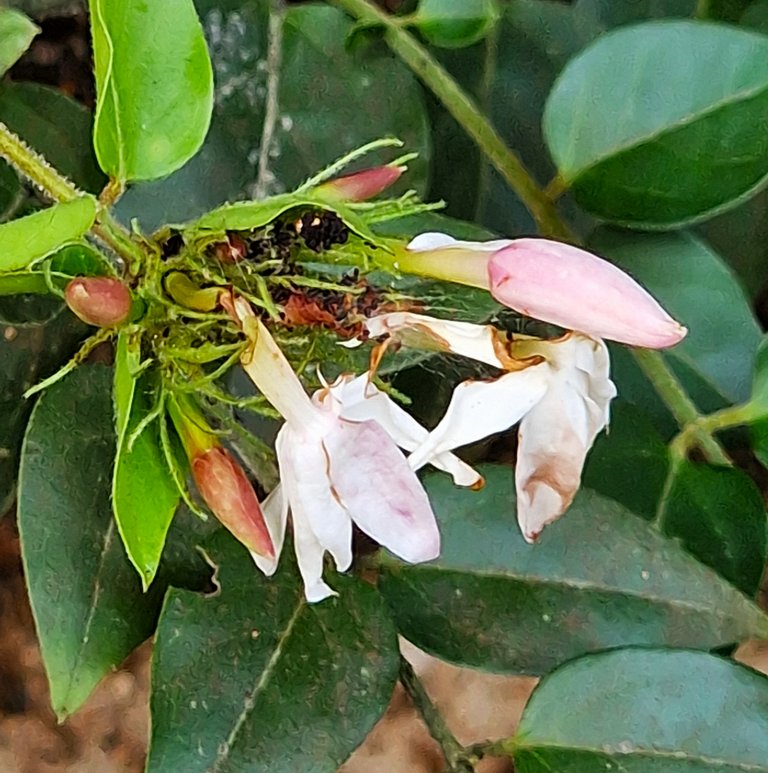 so when we plant a new bush, such as this pomegranate we add ash to the sand. that seems to help keep the termites at bay. the pomegranate is at the end of the flowering season and with any luck we may get some fruits. it's just a small bush still but there have been quite a few flowers
so when we plant a new bush, such as this pomegranate we add ash to the sand. that seems to help keep the termites at bay. the pomegranate is at the end of the flowering season and with any luck we may get some fruits. it's just a small bush still but there have been quite a few flowers
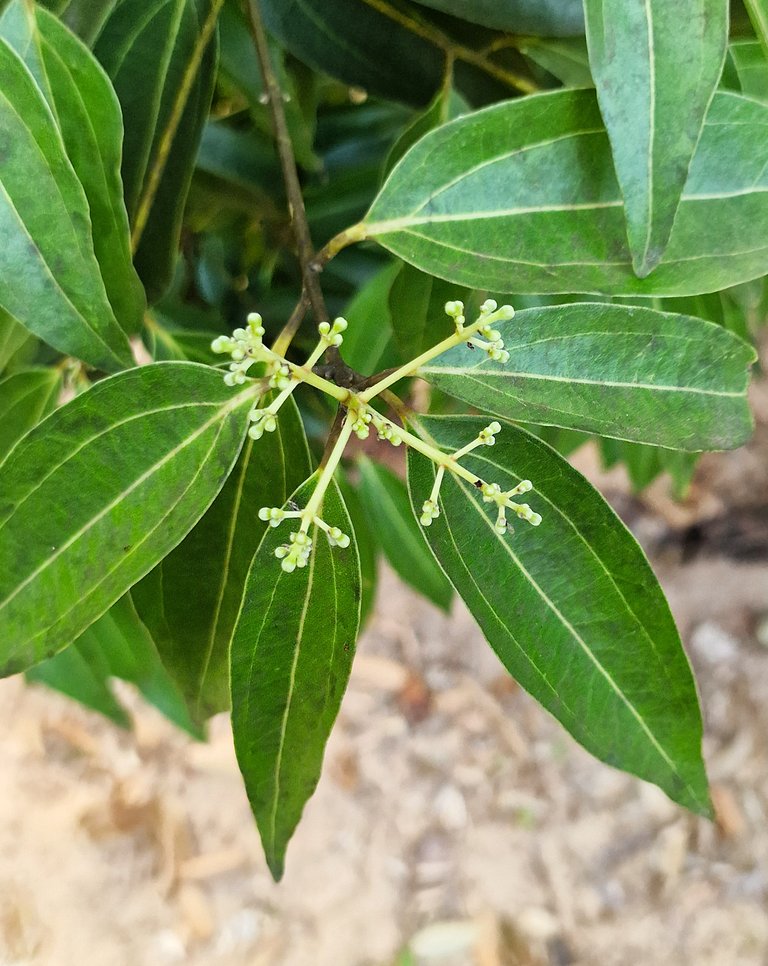 on the other hand the cinnamon tree is just starting to form buds. the flowers are small and inconspicuous but the scent is divinely complex. we don't extract the bark but we do use the leaves and tiny fruits of the tree. both have a wonderful flavor, similar to the bark but distinct from it.
on the other hand the cinnamon tree is just starting to form buds. the flowers are small and inconspicuous but the scent is divinely complex. we don't extract the bark but we do use the leaves and tiny fruits of the tree. both have a wonderful flavor, similar to the bark but distinct from it.
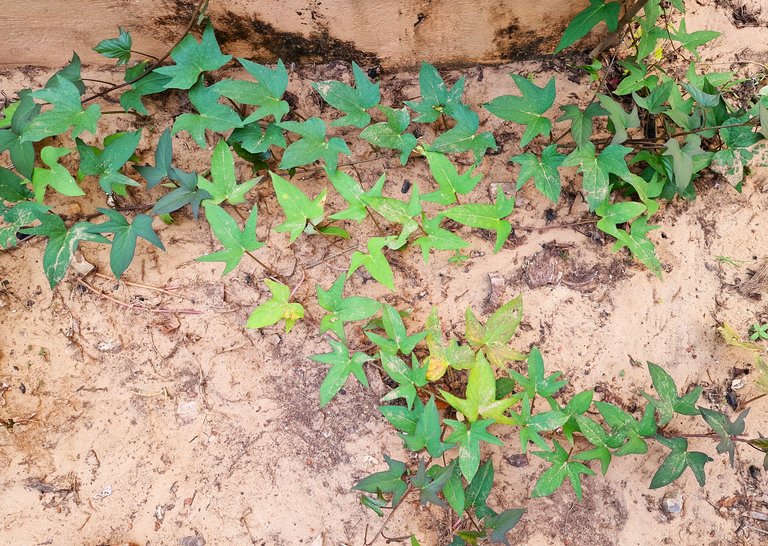 one pleasant surprise are the sweet potatoes that hindavi set last April before we left. they have grown very nicely like vines across a large area behind the house. i had forgotten all about them as we had little expectation of them surviving. they were just an experiment with some remaining sweet potatoes that we didn't manage to eat before we left. so she didn't set many but they have spread and grown many roots and now we are looking forward to harvesting them, maybe in March i guess.
one pleasant surprise are the sweet potatoes that hindavi set last April before we left. they have grown very nicely like vines across a large area behind the house. i had forgotten all about them as we had little expectation of them surviving. they were just an experiment with some remaining sweet potatoes that we didn't manage to eat before we left. so she didn't set many but they have spread and grown many roots and now we are looking forward to harvesting them, maybe in March i guess.
this post is getting long so i will stop here. there are still many things going on that i have not mentioned so i may make a final update soon. thanks for stopping by
Your plants look great, you've done a great job with them
Thank you very much Mr. @eolianpariah2 for sharing this update
Have a beautiful day
the garden is a lot of work but also a great pleasure which i am happy to share
!INDEED
(1/10)
@miprimerconcurso! @eolianpariah2 Totally agrees with your content! so I just sent 1 IDD to your account on behalf of @eolianpariah2.
Is coconut farming profitable? I don't think so. How much money can a coconut plantation make per year? I saw a lot of plants and they can make a lot of profit. Potato farming is very profitable
for us the coconuts are a net expense. we keep them because they look nice and we are guaranteed quality organic coconuts and oil but the sale price has gone up recently but it is still too low. buyers are not willing to pay extra for the organic ones. as i mentioned they want softer flesh to make smooth curries so for most people the firm oil rich organic coconuts are undesirable. some commercial growers operate in profit but there are certainly more profitable crops. we are here in India for the long Norwegian winter so for us to invest in any kind of serious production is useless.
we used to run the place as a ayurvedic clinic with accommodations and food. that venture was quite rewarding in several ways. having an attractive garden was important then but now we are retired and enjoy the birdlife and plants and do our best to keep it looking nice
Thank you for your witness vote!
Have a !BEER on me!
To Opt-Out of my witness beer program just comment STOP below
!INDEED
(2/10)
@isnochys! @eolianpariah2 Totally agrees with your content! so I just sent 1 IDD to your account on behalf of @eolianpariah2.
View or trade
BEER.Hey @eolianpariah2, here is a little bit of
BEERfrom @isnochys for you. Enjoy it!Learn how to earn FREE BEER each day by staking your
BEER.Coconut tree is good for investing. The tree of life 😊
Nowdays coconut, especially old coconut has expensive price
Oh, you had cinnamon tree. I am curious when the stage, we can harvest the skin for cinanamon stalks.
For the bottles, in my area, we can make small raised by collect the bottles 😊
coconuts are very important healthy food and price has gone up. fewer people grow them because the price was too low for a long time. now with higher price maybe more will be available in the market
we never tried to harvest the bark from out cinnamon tree. we tried growing more but only one is thriving. we don't want to damage it so just use the leaves and fruit. they are also nice spices. if you want to know about harvesting the bark there is info on the internet about that
Nice post with amazing photos hard-working gardener, good luck with harvesting sweet potatoes.:)
thanks for the supportive reply. the garden keeps me busy and active. it's a pleasure to see the results of the work
!INDEED
!DUO
You just got DUO from @eolianpariah2.
They have 1/1 DUO calls left.
Learn all about DUO here.
(2/10)
@hindavi! @eolianpariah2 Totally agrees with your content! so I just sent 1 IDD to your account on behalf of @eolianpariah2.
https://www.reddit.com/r/HerbalMedicine/comments/1o0bgeq/adulsa_or_vasa_ayurvedic_herb_justicia_adhatoda/
This post has been shared on Reddit by @eolianpariah2 through the HivePosh initiative.